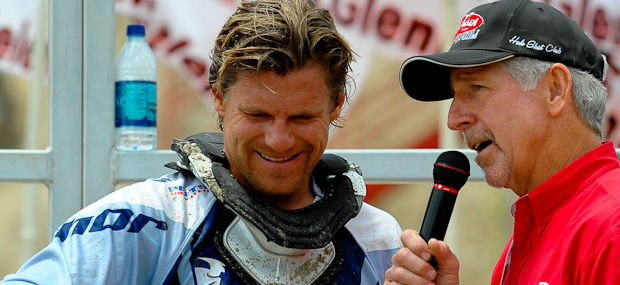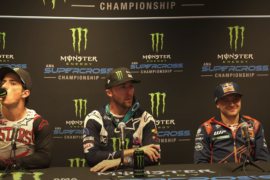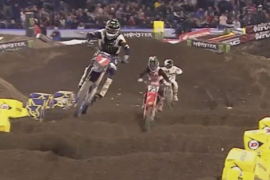There is only a short list of riders throughout motocross history that have won both world motocross championships and U.S. national championships, but even fewer have had to overcome the adversity that Greg Albertyn did to get it done. Greg left South Africa with a head full of dreams at seventeen years old, and before he was done chasing those dreams, he had won the ultimate prize on every continent he set foot on.
We caught up with Greg recently to chat about his career and what he has been up to since retirement. Greg shared his whole story—the triumphs, the struggles, the culture shock, the missteps—from the early days in South Africa through today in what may be one of the most extensive interviews with the legend known as “Albee “to date. Here is part one of hour long conversation we had with Greg.
Thanks for doing this, Greg. What I wanted to talk about was your career as a whole, starting back in South Africa. You paved the way for South Africans like Tyla Rattray and Grant Langston. What was it like in the beginning racing in South Africa?
Well, you know, growing up in South Africa, motocross was definitely small compared to the international scene, but it was a pretty decent-sized sport in South Africa, and we got into it purely because we just loved riding motor bikes. Within a few weeks, we were racing, and it actually grew considerably in the ‘80s. It was rather big, and we had quite a few Americans come over and race over there like Rex Staten and Jim Tarantino—who is actually still down there—and Larry Wasick and Brian Myerscough Each of the manufacturers had to have one representative, so it got very competitive and definitely raised the level of the sport in South Africa.
What was the racing like? Was it a national level?
Well, we didn’t really have—it wasn’t segregated into amateurs and pros. There were probably a handful of guys that were actually making money as a pro, but we would do the whole national series, the 80ccs that I was racing at the time and the 100s. There was a 12-race series all throughout South Africa, and everybody would go. Everybody would compete from whatever age they were all the way through the quote “pros.” It was definitely the four Americans that were making money and maybe there were one or two South Africans that were making money and getting paid to race.
Who were the South African guys that you looked up to that you raced with back then?
I’m not sure of many of them that you’ve heard of, but there was Brett Redman; I know he came and did quite a few races over here, maybe even tried to race Anaheim once or twice. Then there were guys like Karl Prestwood who went to Europe, Colin Dugmore who is still in Europe and, then, Robbie Herring who’s probably one of the fastest guys. He ended up in England.
At what point did you think that you could get out of South Africa and actually make a living racing motocross internationally?
You know, it was probably when I was—I’d have to say—13 or 14. That’s when it really started to hit me that if I carried on on the path that I was going on that I may have the speed and the ability to compete and to compete internationally. You know, Mark Johnson, who was the Team Green guy, he came over in ’85 with a bunch of riders. That’s when Jeff Matiasevich came over, Tyson Vohland, who else? There were a few of them, and he actually watched me ride and was like, “Yeah, you definitely have some talent.” So it was at that period where I realized that potentially something could happen, but you know, it’s a big jump between potentially and making it happen.
So what was it that finally got you to make the big move?
Well, at that point, I turned pro, so my folks had a tough decision. Do they let me finish my very last year of high school and wait till I’m 18 to go over, or do we go pro at 17? We went to just test the waters out. I went over at the end of 1989 and did a few supercross races in Europe: Maastricht in Holland, Paris, Bercy, Geneva Supercross—things like that. And I did pretty well. You know, nobody knew who the heck I was, and everybody was asking who this South Africa kid was. We’d come to realize that wow, we may be on to something here. Then there was the local bike dealership in Belgium that supported me for those four races. They said they would like to help me out with some of the GPs and stuff like that. So that’s when I went back for my first full season in Europe. I was 17, and I moved there in 1990.
That had to have been a huge deal. Did your folks go with you or any family, or did you just grab gear bag and go?
My folks weren’t with me for a while and, to be honest, that was probably the toughest two years of my life that I’ve ever experienced. It was very, very hard. You know, getting on a plane in Johannesburg and saying goodbye to family, friends, not knowing what lay out there, not knowing when I’m going to see them again, and then all of the sudden you get to Europe and there’s this massive culture shock, weather shock—I mean, just everything. It was very, very tough to get the cream to rise to the top.
So when did you start doing really well in Europe? I mean, at what point did you realize, “Wow, I can do this?”
Well, I got over there in 1990 which was a rude awakening being the best in South Africa. You know, I’m winning consistently every week and then all of the sudden now I’m one of 25 guys that can go just as fast. And the first GP I ever entered, I think I finished like 20th or something overall. The second one was in Holland, and Bobby Moore and I were actually battling and I think I got 4th or 5th overall in my second GP. Then in the third Grand Prix, I broke my navicular and missed the whole rest of the season. So at the end of 1990, I actually went back to South Africa humiliated, tail between my legs, coming back with nothing. I mean, I had nothing. And man, we just came back. It was December in South Africa, and I was just going, “Lord, what the heck do you have for me? I don’t know what the plan is.” And the next minute, this fax comes through. It was from Jan De Groot, the owner of the JHK team in Holland, and he liked what he saw in Holland because it was a sand track and, you know, I was this young kid that he’d never seen before and I ended up getting 5th at the GP. He needed somebody to come and compete in the Dutch National Championship. Being a Dutch-based team, he wanted somebody to win the Dutch Championship and give all the Dutch sponsors what they were looking for.
That had to be huge for you.
Yeah, so from having nothing, nothing, nothing to all of the sudden having a mechanic, a truck paid for, actually a ten-thousand Dutch guilder salary. I mean, I just thought I’d died and gone to Heaven. From having nothing and all of your dreams shattered to, wow, you’ve been given a breath of fresh air and a fresh opportunity.
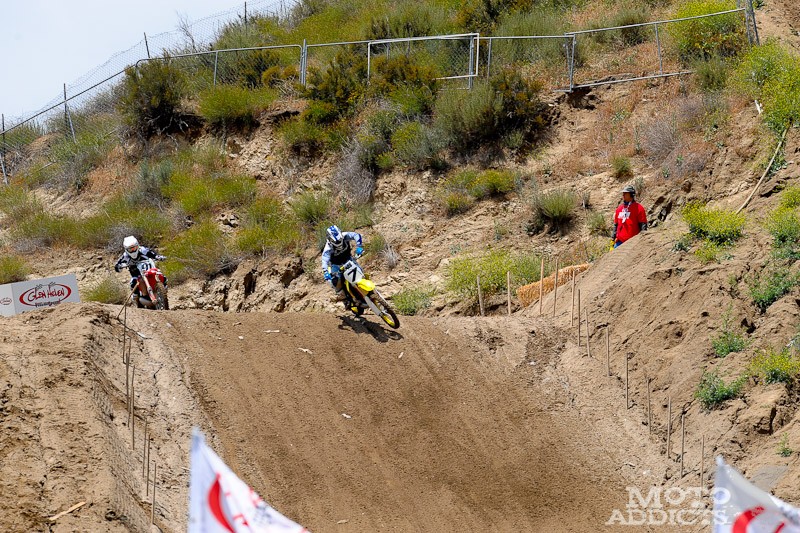
So did you win the Dutch national title on that first attempt?
You know, I’d have to—maybe you can do this—go back and look at the storybooks. I don’t remember. I may have, but typical Dutch, we had some conflict, and because I was not a Dutch citizen the first year I won it, the Dutch challenged it maybe two or three times. I can’t remember. But the first year that I won it, they didn’t actually award me with the title because I wasn’t Dutch, which is kind of weird, but then after the next couple of years, they did. I think I may have won it in ’91, but I can’t remember.
How many national titles did you win in South Africa before you left?
5 National titles there—you know, all sort of amateur type stuff all the way from 80ccs.
Yeah. Is there a lot of sand in South Africa?
You know, we definitely had some sand tracks. There weren’t a ton, but there were some sand tracks. I enjoyed sand, and we had some sand quarries I used to go play riding in and stuff like that. But yeah, once you get to Belgium and Holland, that’s all there is. You get a baptism by fire where that’s all there is to ride; it’s just sand.
So you go on and you win the 125 World Championship in ’92. Was that a surprise for you, or at that point, were you just rolling in confidence and thought you could do it?
No, not at all. I mean, I got my first GP podium ever in ’91, and I think I podiumed like three or four times. And then, it was actually the last race of the year in Japan at Suzuka circuit, I was leading and actually pulling away. I ended up crashing, but for the first time ever, I realized, “Wow, I actually have what it takes.” So for the very first GP of ’92, I was racing with John Vanderburg and Dave Strijbos—and these guys were both World Champions—and I ended up going and winning the overall at the first GP of ’92. And at that point, I knew, “Okay, now I know I can do it.”
Yeah, I mean you beat some huge competition in Dave Strijbos and Pedro Tragter. They were no slouches, so you had to kind of take them by surprise.
Yeah, I mean, absolutely. Both Strijbos and Vanderburg were world champions, and obviously, Tragter was very solid. So yeah, there was some serious competition. The only guy that wasn’t there was [Stefan] Everts; he had moved up to 250s at that point.
What was the decision-maker to move up to 250s so quickly after winning your first world title? Was that Honda?
No, not at all. Ironically for me, I’ve always—once I’ve accomplished one thing—I want to move on to the next. I admire and respect these guys that can go year after year after year wanting to win the same title over and over again. For me personally, that’s just not my character. Once I’ve achieved something, I’m looking for the next thing. I don’t know why. That’s just me. So once I was World Champion on the 125s—the 250s for that following year became the premier class. Before that it was always the 500s and the FIM took a change of direction because, I think, they had stopped or were slowing down on making 500cc bikes, so they then made the 250s the premier class, and I wanted that challenge. A lot of the 500 guys were coming down, a lot of the 125 guys were going up.
How were you received in the 250 class? This South African kid coming in and taking it to Donnie Schmidt and Stefan Everts and the boys?
Well, I don’t think anybody thought I was a threat at all. Nobody thought I would jump straight from the 125s and dominate the 250s. I mean, they just didn’t. In the ’92/’93 era, there were three motos, 25 minutes plus two laps giving us three races over thirty minutes. You had to be extremely fit. The very first moto of the year, I ended up finishing third or fourth. I came in to Ian [Harrison]—at this point, Ian was working for me. I had no front brake the whole race; the mounting was mounting wrong so it kept hitting the bolt. I told Ian, “If you fix this thing, I know I can win it.” And the rest is history. ’93 was by far my most dominant, best season of my career. I mean, I just killed it.
What was that feeling like—I mean, if you can give it to me—winning the premier World Championship in your rookie year? If you could bottle that feeling, I’m sure I would buy a case.
I mean, there are very few words that can describe it, but you are on top of the world; there’s no better feeling. I could look left and look right down the starting line and just know that I was going to kick everybody’s ass, and it was more a mental thing than a physical thing. I mean, it’s funny, I’m not a head games player, but I had those guys so wound up that I just dominated them after the first two races. Mentally, they were worked.
Yeah, I could imagine how they felt. I couldn’t imagine being an outsider in a level like the World Championships and having that kind of feeling of knowing that I’m the best in the world today. It had to be intense.
Yeah, you know, it’s a feeling that I’ve never experienced in anything else in life. I mean, I’ve made real estate deals where I’ve taken a check to the bank for a million and a half dollars in one check, and let me tell you, it does not compare to standing on top of the podium and knowing that you’ve kicked everybody’s butt. You’re on top of the world. There are very few feelings in the world that also match that.
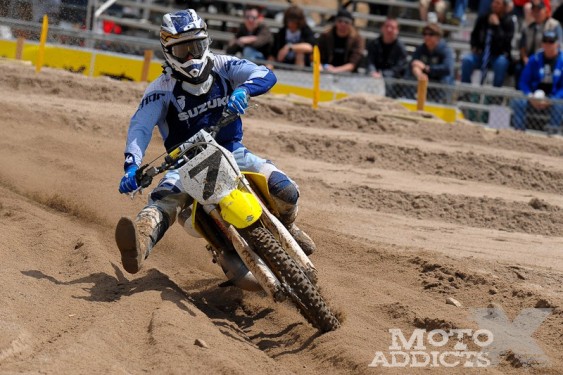
You were the very first South African champion, correct?
Yeah, I was the first from the African continent ever to win a World Championship, totally. And you know, I think that’s part of why I was so hated in Europe. I mean, Everts came from this motocross pedigree. His dad raced, five-time world champion. He was born with a silver spoon in his mouth, full factory ride by the time he was seventeen. I mean, he was just expected to dominate. And then this young punk from another country with a massive, cocky little attitude comes and smokes him. I mean, they hated me. They absolutely hated me.
(Laughs) I can imagine. Going back a little bit, how did you and Ian Harrison, your mechanic, hook up in South Africa?
Well, Ian used to race. Ian and his brother raced in South Africa, and we actually became friends in ’87. You know, he used to ask my dad for some jetting advice and stuff like that, and we became friends and started hanging out. He had graduated high school and was actually working for one of the local municipalities becoming a diesel mechanic. And just being as lonely as I was in Europe and as hard as it was, I longed for some friendship. At that point, I was like “Hey”—I mean, he always worked on his own bikes so I was like, “Hey, do you want to come over with me?” After two years in Europe, he came over with me in ’92, and I think within ten days of being there, he was ready to pack his bags and head back. I mean, his eyes were just wide open, and he couldn’t believe how miserable and tough it was.
Do you think having the comfort of a good friend from back home was a big catalyst to what you accomplished in ’92 and ’93?
It certainly helped, but I was so focused on the mission and the goal that, Lord willing, I think I would have accomplished it anyway because there was no turning back for me. I was on a mission, but I mean, it certainly helped. And, you know, to this day, he’s still my best friend. We’ve forged such a huge bond and relationship. He’s been a big blessing in my life.
He’s got to owe you a debt of gratitude big time. He has earned it all, obviously, from when he got here, but his individual accomplishments since leaving South Africa—to work with you and then continuing on with Roger DeCoster and Team Suzuki and now with Red Bull/KTM—is an incredible story in itself.
Yeah, I’m very, very proud of him. You know, he’s always behind the scenes and never really gets the credit that he deserves, but yeah, starting out as a diesel mechanic in a local little municipality to becoming almost the right-hand man to one of the top teams in the world. Trust me, he deserves every bit of credit he gets and then some because he’s so diligent and works so hard.
Yeah. And that Honda you rode in ’93—you weren’t a full factory-backed team at that time, correct?
Not at all. We were just a little Dutch-based team, and the owner of the team was a great engine tuner. I mean, he was very, very good at that, but I think we got one crank or maybe two cranks and a little bit of suspension, but that was it. That was all we got from Honda.
(Laughs) Here’s a crank and some forks. Now go win a World Championship, kid.
Yeah, seriously.
So you were about twenty at that point, correct?
Correct. Yeah, exactly.
What brought you to Suzuki in ’94? Was that a precursor to your trip to America, go to Suzuki and then they’ll bring you here?
No, I actually ended up on Suzuki by default. I had just won the ’93 World Championship. I had been in negotiations with Dave Arnold from Honda to come over to the race in the States for the ’94 season, and he had actually sent me a preliminary contract at the time for about—I actually still have it—$350,000 for the ’94 season for Supercross and motocross. It was very good money. We actually agreed to meet at Suzuka circuit, the last GP of the year, to go sign the agreement, make it all formal and everything else. So I started telling my team manager, “Listen, I’m heading to the States. It’s a done deal. I’ve got an offer,” and everything else. In Europe, the protocol used to be different than the way it is now. You always waited for the top rider sign his agreement, and then the next guys—the second guy—would sign and then the third guy, and it kind of went on down the list. There wasn’t as much chopping and changing. Anyway, before I even knew what happened, we go to Suzuka circuit and Dave Arnold comes up to me white-faced, and he says, “I’ve just been told by the Honda execs that I’m not allowed to sign you. You guys are racing in Europe. They’re not putting any money into the program, and you guys are winning World Championships. Why would they now pay you to come and race with [Jeremy] McGrath who’s already winning in the States when you guys are winning World Championships for them there? So I cannot do it.” And obviously at that point, I was just like, “Holy smokes.” I went back to Jan [De Groot] and I said, “Well, it looks like I’m going to be staying in Europe another year. Let’s get this thing figured out.” And he said, “Oh well, I’m sorry. I’ve just signed Everts. It’s a done deal.” So at that point, I was left without a ride. Now, of course, I’ve got to figure something out. We had two absolute gentlemen of the sport—Michele Rinaldi and Sylvan Geboers—both presented me with offers. They obviously collaborated beforehand and both came in with the exact same offer: whole gear, whole bike, whole package deal. Unfortunately, it was with that crappy Bieffe gear, but I had no choice; that was the deal. So for ’94, I was stuck and ended up racing, really in essence, on Everts’ bike in ’94. It certainly took me a while to get it adjusted to my style.
Yeah, I was on Suzukis in ’94, so I definitely know what you were dealing with, and I didn’t have the factory-backing to make the thing work right. (Laughs)
Well, you probably were better off because they were going in such the wrong direction that it was frightening. I mean, it was really bad. (Laughs)
So you win the World title in ’94. When Sylvan signed you to the Suzuki deal, was part of the deal that you would head to the States in ’95?
That was not necessarily part of the deal. He knew where I wanted to go, obviously, and we would then try to start negotiating, but at that time, Suzuki’s program in the States was a total disaster. I mean, they really didn’t have any sort of anything solid. So part of my stipulation was that Roger DeCoster had to become team manager. In July of ’94, Roger came to my apartment in Belgium. He was doing some freelance stuff for some European teams. I said, “Listen, I want to go to Suzuki, but their program’s junk. Part of the thing is you need to be there, and we need to have Ian as well.” At that point, Roger’s deal got accepted, my deal got accepted, and Ian came along. We made it happen.
Part two continues later with Greg’s move to the U.S. and his 1999 AMA 250cc National Championship and will be posted in a few weeks.

